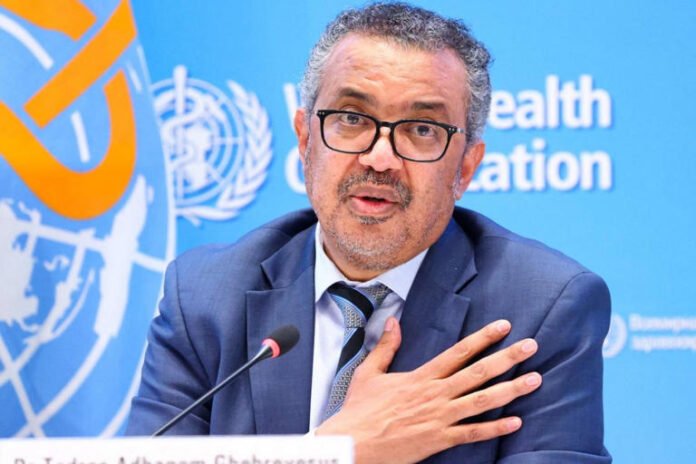The World Health Organization (WHO) Director-General, Dr. Tedros Adhanom Ghebreyesus, narrowly escaped harm during an Israeli airstrike on a Yemeni airport. The incident occurred on December 26, 2024, at Aden International Airport, where Dr. Tedros was reportedly “just a few meters” away from the impact zone.
The Incident
Dr. Tedros was visiting Yemen to assess the country’s deteriorating healthcare infrastructure amid its prolonged civil war. Aden, a city that has served as a hub for international aid efforts, has increasingly become a flashpoint in the region’s ongoing conflict. The airstrike targeted the vicinity of the airport, leading to significant damage to its infrastructure and sparking panic among the civilians and aid workers present.
According to eyewitness accounts, Dr. Tedros and his delegation were disembarking from a United Nations-chartered plane when the attack occurred. The WHO Chief was quickly escorted to safety by his security team, but the incident left several others injured and caused substantial destruction to the airport’s facilities.
Dr. Tedros’ Reaction
In a statement released shortly after the incident, Dr. Tedros expressed gratitude for his safety but lamented the ongoing violence that jeopardizes humanitarian missions. “I was just a few meters away from the impact. This incident highlights the grave risks that healthcare workers and aid providers face in conflict zones. My thoughts are with those injured and affected,” he said.
He further called for an immediate cessation of hostilities and urged all parties to respect international humanitarian laws. “Hospitals, airports, and aid corridors must never be targets,” he emphasized, pointing to the growing challenges faced by healthcare providers in Yemen.
The Context of the Strike
The airstrike is part of escalating tensions between Israel and Iran-backed Houthi rebels, who control large swathes of northern Yemen. While Israel has yet to officially comment on the incident, military analysts believe the strike was aimed at disrupting alleged arms shipments to the Houthi forces.
Yemen’s prolonged conflict, which began in 2014, has resulted in one of the world’s worst humanitarian crises. With millions displaced, widespread famine, and a collapsing healthcare system, the country is heavily reliant on international aid. However, increasing hostilities and attacks on critical infrastructure have made it perilous for humanitarian missions to operate.
Global Reactions
The international community has expressed outrage over the incident. United Nations Secretary-General António Guterres condemned the attack, stating, “This reckless strike endangers not only civilian lives but also the global humanitarian efforts in Yemen.” He called for an independent investigation into the attack and stressed the need for accountability.
Several humanitarian organizations, including Médecins Sans Frontières (Doctors Without Borders) and the International Red Cross, echoed similar sentiments. “When those tasked with saving lives are put at risk, it’s a dark day for humanity,” said a statement from the Red Cross.
The Impact on Yemen’s Health Crisis
The Aden airstrike further complicates efforts to address Yemen’s dire health situation. Dr. Tedros’ visit was intended to spotlight the urgent need for resources and global attention to the country’s crumbling healthcare system. Yemen is battling multiple health crises, including cholera outbreaks, malnutrition, and the aftermath of COVID-19, all exacerbated by ongoing violence.
Health workers and facilities in Yemen have frequently been targeted, either directly or as collateral damage in military operations. According to the WHO, over 50% of Yemen’s healthcare facilities are non-functional, and those that remain are struggling to cope with the overwhelming demand.
Calls for Action
The Aden incident has reignited calls for international intervention to protect aid workers and ensure the delivery of humanitarian assistance in conflict zones. Experts argue that the lack of accountability for attacks on aid missions emboldens perpetrators and exacerbates suffering.
Dr. Tedros has vowed to continue advocating for Yemen despite the risks. “This incident has only strengthened my resolve to stand with the people of Yemen. They deserve peace, health, and dignity,” he said in his closing remarks.
Looking Forward
As global tensions rise and conflicts become increasingly complex, the safety of humanitarian missions remains a critical concern. The international community faces the daunting challenge of balancing geopolitical interests with the urgent need to address human suffering. The attack on Aden Airport serves as a grim reminder of the stakes involved.
For now, Yemen’s health crisis remains an urgent priority, with Dr. Tedros’ narrow escape highlighting both the risks faced by those trying to help and the resilience required to persist in such efforts. The world watches, hoping for a resolution that prioritizes humanity over hostility.

